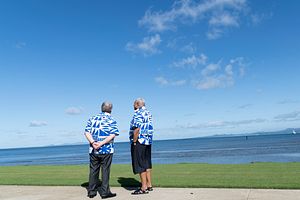This week United Nations Secretary-General Antonio Guterres made a trip through the islands of the South Pacific, visiting Fiji, Vanuatu, and Tuvalu. His visit to the region was conducted with the specific aim of highlighting the existential threat that climate change is posing to these island states. Although this was his first trip to the South Pacific in his current role as Secretary-General, it was nevertheless a demonstration that the Pacific’s unique experience and perspective on these issues should be of greater importance in the world’s peak multilateral forum.
Guterres gave a speech as part of the High Level Political Dialogue between the UN Secretary-General and the leaders of the Pacific Island Form (PIF) in Suva, Fiji. In his speech, he outlined the current shifts in the planet’s environment and their potential knock-on impacts. Guterres also used the speech to commend the work that Pacific Islands states are doing in order to try and raise global awareness of these issues and seek mitigating behavior from other states, stating that “The United Nations is strongly committed to supporting your response to climate change and reversing the negative trends that have put your cultures and very existence at risk.” He concluded that in in regards to climate change, “the Pacific has a unique moral authority to speak out.”
In highlighting this authority, Guterres acknowledged the work that Pacific Island states have done to place themselves at the center of this issue. For small states like those in the Pacific, gaining global attention for issues that affect them can be difficult. However, in recent years these states have been able to forge a collective strategy and developed a much more assertive diplomatic posture, enabling them to create a clearer and outsized voice to promote an issue that is in their vital interest. This more assertive diplomatic approach was highlighted by Fiji’s recent presidency of the COP23 forum.
A major component within the strategy of the Pacific Island states has been a new conceptual framework for the region known as the Blue Pacific, where Pacific Island states have been repositioning themselves as “large ocean states,” rather than “small island states.” Through this lens, these states see themselves as the dominant custodians of the Pacific Ocean and take responsibility for the health of its interrelated ecosystems. However, the responsibility of these states alone cannot provide solution to problems that do not recognize political boundaries.
The transnational nature of the phenomenon is something that is keenly felt in the Pacific. These are states that emit negligible carbon emissions themselves, but are disproportionately affected by the emissions of others. This was reflected in the Boe Declaration that was established at the Pacific Island Forum meeting held on Nauru in October last year. In the declaration, the signatories “reaffirm[ed] that climate change remains the single greatest threat to the livelihoods, security and wellbeing of the peoples of the Pacific, and our commitment to progress the implementation of the Paris agreement.”
Recognizing the breadth of the security threat identified in the Boe Declaration, Guterres noted during his speech in Suva that “military strategists see clearly the possibility of climate impacts increasing tensions over resources and mass movements of people everywhere in the world.” The framing of the situation in these terms has the potential to provide a greater comprehension of the potential effects of a changing climate than might otherwise be recognized by larger, more powerful, and more polluting states.
To coincide with the visit by Guterres, the Pacific Island Forum issued a statement asking the UN Secretary-General to widely spread their blunt plea: “The Blue Pacific – our great ocean continent, our thousands of islands, our strong and resilient people – is running out of time.” Adding that “ All countries, with no caveats, must agree to take decisive and transformative action to reduce global emissions … If we do not, we will lose. We will lose our homes, our ways of life, our wellbeing and our livelihoods. We know this because we are experiencing loss already.”
Despite this plea, these Pacific Island states have not been trying to play the victim or simply seek undue sympathy. Instead, they are attempting to try and foster a realization that the forces that will initially come for the Pacific, will also eventually come for everyone else. The Pacific may be the on the front line for the effects of a changing climate, but they won’t be the last line.

































